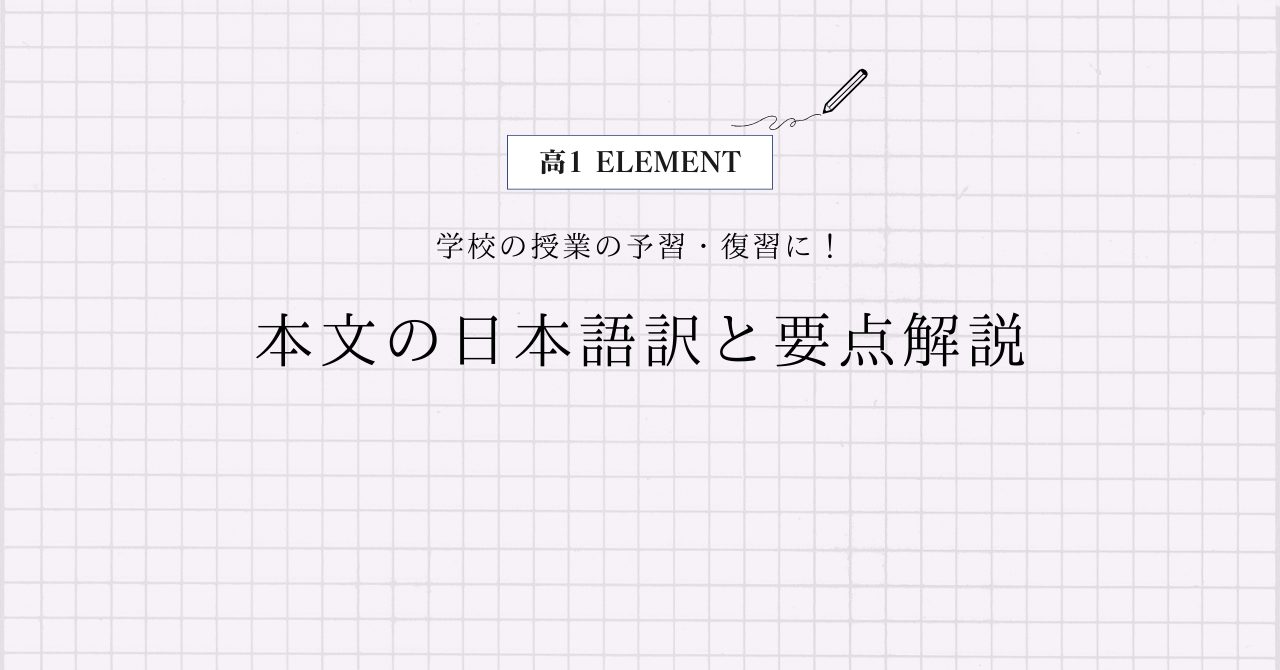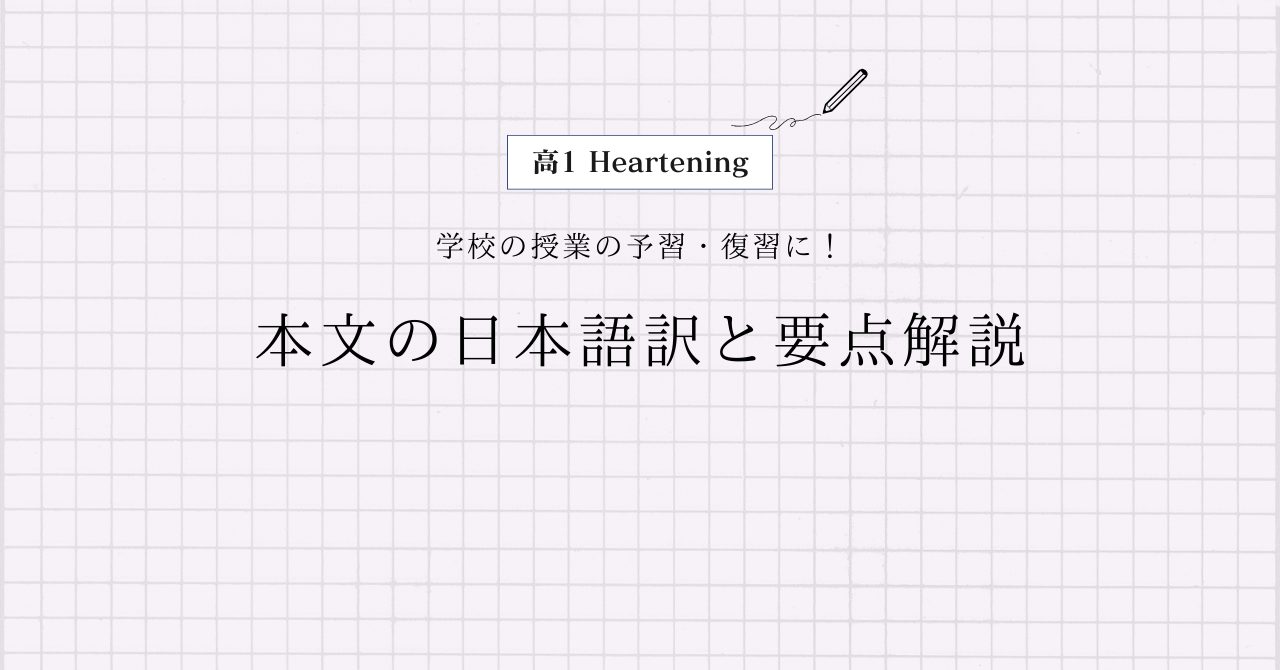三省堂 高1ELEMENT Lesson6 Section4の本文の日本語訳と重要箇所の解説です。
Lesson6-1, 6-2, 6-3の解説はこちらからご覧ください。
>高1ELEMENT Lesson6 Section1 本文和訳
>高1ELEMENT Lesson6 Section2 本文和訳
>高1ELEMENT Lesson6 Section3 本文和訳
- ELEMENT Lesson6 Section4 本文と日本語訳
- ELEMENT Lesson6 Section4 重要事項の解説
- Eiko returned to Japan after two years in Brazil.
- When she was 34, a professor at the university from which she graduated asked her to write some nonfiction about Brazilian children.
- She had never written a story and thought it impossible, but he wouldn’t stop asking her to write.
- So, she thought she could write about Luisinho.
- She worked hard for several months and succeeded in writing the story.
- Through this experience, she realized that writing was what she loved to do and decided to do it the rest of her life.
- Because of that, her life began to seem ever so much more fun!
- She believes words in stories combine with the reader’s feelings and mood at the moment they are read.
- The words combine with the reader’s imagination and become part of their inner dictionary.
- This dictionary gives great power to imagine and create, which supports people even in hard times.
- Eiko also believes stories have the power to bring people together.
- Believing this, she will continue to write.
- ELEMENT Lesson6 Section4 まとめ
ELEMENT Lesson6 Section4 本文と日本語訳
Eiko returned to Japan after two years in Brazil.
「栄子さんはブラジルに2年いた後、日本に戻りました。」
When she was 34, a professor at the university from which she graduated asked her to write some nonfiction about Brazilian children.
「34歳のとき、彼女が卒業した大学の教授が彼女に、ブラジルの子どもたちについてのノンフィクション作品をいくつか書いてほしいと頼みました。」
She had never written a story and thought it impossible, but he wouldn’t stop asking her to write.
「彼女は一度も物語を書いたことがなかったのでそれは無理だと思いましたが、彼は書くように頼むのをやめるつもりはありませんでした。」
So, she thought she could write about Luisinho.
「そこで、彼女はルイジーニョについてなら書くことができると思いました。」
She worked hard for several months and succeeded in writing the story.
「彼女は数か月間一生懸命に取り組み、物語を書くことに成功しました。」
Through this experience, she realized that writing was what she loved to do and decided to do it the rest of her life.
「この経験を通して、書くことは自分が大好きなことなのだと気づき、そして残りの人生でもそれをしようと決めました。」
Because of that, her life began to seem ever so much more fun!
「そのことが理由で、彼女の人生は今まで以上にもっと楽しく思え始めました。」
She believes words in stories combine with the reader’s feelings and mood at the moment they are read.
「彼女は、物語の言葉はそれらが読まれるときの読者の感情や気分と結びつくと確信しています。」
The words combine with the reader’s imagination and become part of their inner dictionary.
「言葉は読者の想像力と結びつき、そして彼らの内になる辞書の一部になります。」
This dictionary gives great power to imagine and create, which supports people even in hard times.
「この辞書は想像や創造するための大きな力を与えてくれて、困難な時にも人々を支えてくれます。」
Eiko also believes stories have the power to bring people together.
「栄子さんはまた、物語には人々を繋ぐ力もあると信じています。」
Believing this, she will continue to write.
「このことを信じているので、彼女は書き続けるのでしょう。」

ELEMENT Lesson6 Section4 重要事項の解説
Eiko returned to Japan after two years in Brazil.
“return“は「戻る、帰る」といった動詞で、“after“は「~の後で」という前置詞になります。
When she was 34, a professor at the university from which she graduated asked her to write some nonfiction about Brazilian children.
ここでは「接続詞when」が使われていますね。
“professor”は「教授」、“university”は「大学」という名詞で、“graduate from~”は「を卒業する」という表現になります。
“which”は「目的格の関係代名詞」で、“from which she graduated”が先行詞“the university”を修飾していますね。
もともとは“the university which she graduated from”ですが、最後の前置詞“from”が今回は前に移動しています。
“ask 人 to 動詞の原形”で「人に~するよう頼む」という重要表現で、“some”は「いくつかの」という形容詞、“nonfiction”は「ノンフィクション作品」という名詞です。“some”は不可算名詞にも使えますよ。
“Brazilian”は「ブラジルの」という形容詞になります。
She had never written a story and thought it impossible, but he wouldn’t stop asking her to write.
“had never written”は「過去完了の経験用法」ですね。
“think 名詞 形容詞/名詞”で「名詞が~だと思う」という重要表現になります。
“it”は直前の文の“to write some nonfiction about Brazilian children”を指していて、“impossible”は「不可能な、無理な」という形容詞です。
この“would”は“will”の過去形で、“asking”は「動名詞」になっていますね。
So, she thought she could write about Luisinho.
この“so”は「そこで」といった副詞です。
“thought”の後ろには「接続詞that」がありますね。“could”は“can”の過去形です。
She worked hard for several months and succeeded in writing the story.
“work”は「働く、取り組む」という動詞で、“hard”は「一生懸命に、熱心に」という副詞です。
“for 数字”は「~間」という意味で、“several”は「いくつかの」という形容詞になります。
“succeed”は「成功する」という動詞で、“succeed in~”で「~に成功する」という意味です。
“writing”は前置詞“in”の後ろなので「動名詞」になっていますね。
Through this experience, she realized that writing was what she loved to do and decided to do it the rest of her life.
“through”は「~を通して」という前置詞で、“experience”は「経験、体験」という名詞ですね。
“realize”は「に気づく、を実感する」といった動詞で、後ろには「接続詞that」がありますね。
“writing”は「動名詞」、“what”は「関係代名詞」で,“what”1語で“the thing(s) that~(~ということ・もの)”という意味を持ちます。今回は「目的格の関係代名詞」ですね。
“what she loved to do”は“the thing that she loved to do”ということで、直訳すると「彼女がするのが大好きなこと」となります。
“decide”は「を決める」という動詞で、“decide to 動詞の原形”の形でよく使います。
“it”は“writing”を指していて、“rest”は「残り、休憩」という名詞です。
“rest of~”で「~の残り」という意味になります。
Because of that, her life began to seem ever so much more fun!
“because of~”は「~が理由で」といった理由や原因を表す重要表現です。“that”は直前の文全体を指しています。
“life”は「生活、人生、命」という名詞で、“began”は“begin(を始める)”の過去形ですね。
“seem”は「に思える、~らしい」といった動詞で、“to seem”は「不定詞の名詞的用法」です。
“ever so”は「非常に」といった副詞表現で、“much”は「比較級」の強調に使います。
“more”は“much(たくさんの)”の「比較級」で、“fun”は「楽しさ」という不可能名詞ですね。
She believes words in stories combine with the reader’s feelings and mood at the moment they are read.
“believe”は「を信じる、だと確信する」といった動詞で、後ろには「接続詞that」が省略されていますね。
“combine with~”は「~と結びつく」という表現で、“reader”は「読者」、“feeling”は「感情」、“mood”は「気分、機嫌」という名詞になります。
名詞に‘sを付けると「~の」という所有を表します。
直前の名詞が複数形のときは” teachers‘ “のようにアポストロフィーだけを最後に付けます。
“moment”は「瞬間」という名詞で、“at the moment”は「ちょうどその時」といった意味になります。
また、“moment”の後ろには「関係副詞when」が省略されていて、“they are read”が先行詞“moment”を修飾しています。
“they”は“words in stories”を指していて、“are read”は「受動態」になっていますね。
The words combine with the reader’s imagination and become part of their inner dictionary.
“imagination”は「想像力」という名詞で、“become”は「になる」という動詞ですね。
“part of~”は「~の一部」という重要表現で、“their”は「読者」を指しています。
“inner”は「内側の」といった形容詞で、“dictionary”は「辞書」という名詞ですね。
This dictionary gives great power to imagine and create, which supports people even in hard times.
“power”は「力、権力」といった名詞で、“imagine”は「を想像する」、“create”は「を創造する、生み出す」といった動詞になります。
“to”は“imagine”と“create”の両方につながっていて、“great power”を修飾する「不定詞の形容詞的用法」ですね。
“which”は「主格の関係代名詞」ですが、カンマが付いているので「非制限用法」で、“which supports people even in hard times”が直前の文全体を修飾しています。
“which”は文を先行詞にすることもできますよ!
また、「非制限用法」は名詞の補足説明をしたいときに使います。訳すときはふつう前から順に訳していきます。
“support”は「を支える、支持する」という動詞で、“even”は「~でさえ」という強調を表す副詞、“hard”は「大変な、辛い」といった形容詞になります。
Eiko also believes stories have the power to bring people together.
“also”は「また,さらに」といった副詞で,付け加える役割があります。色々な文で使うので必ず覚えましょう!
“believe”の後ろには「接続詞that」が省略されていますね。
“bring people together”は「人々を繋ぐ」という表現で、“to”が付いているので“the power”を修飾する「不定詞の形容詞的用法」になっています。
Believing this, she will continue to write.
“Believing this”は「分詞構文」になっていて、接続詞“Because(As/Since)”と主語の“she”が省略されて、“believe”が“Believing”とing形になっていますね。
“continue”は「を続ける」という動詞で、“to write”は「不定詞の名詞詞的用法」です。
ELEMENT Lesson6 Section4 まとめ
以上がELEMENT Lesson6 Section4の日本語訳となります。
「関係代名詞」「分詞構文」などの使い方をしっかり確認しておきましょう!
>高1ELEMENT Lesson6 Section1 本文和訳
>高1ELEMENT Lesson6 Section2 本文和訳
>高1ELEMENT Lesson6 Section3 本文和訳
何か分からない点や他に解説してほしい点があれば,お気軽にコメントしてください!



コメント